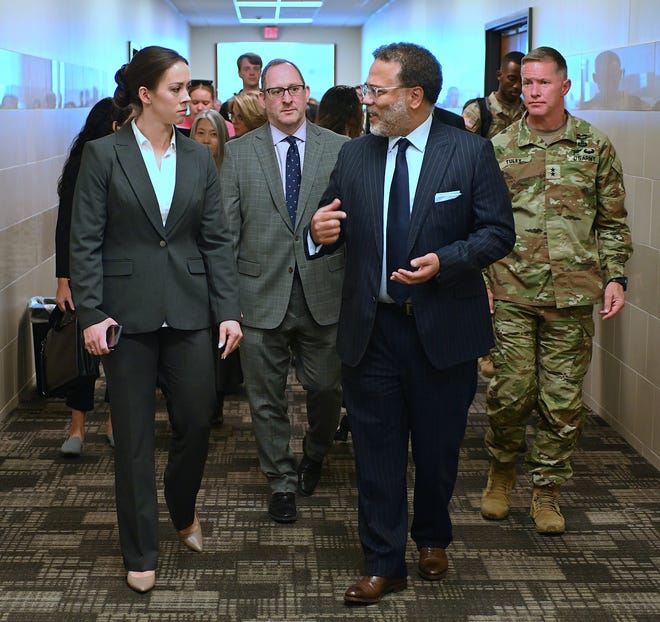Consider this a message to the military community. “Uncle Sam wants you.”
Also.
North Carolina currently has more than 18,000 job openings in the cybersecurity field.
more:Pitts: A Fayetteville veteran answered the call. Let's make something nice.
Veterans, their spouses, and college students are good candidates for these jobs. Attendees at Wednesday's cybersecurity hiring event at Fayetteville Technical Community College included White House National Cyber Director Harry Coker Jr., community college officials, private employers and Fort Liberty officials. , received that message with a unified voice from veterans advocacy groups.

Coker, who took the job in December, is a military veteran who comes from a veteran family. He held senior positions at the Central Intelligence Agency. He as the Director-General of the National Security Agency. and a naval officer.
“I know what it means to wear the uniform and be part of a military family,” Coker said in a speech at the Tony Rand Student Center. “But when we took off our uniforms, we also knew what it meant to continue to protect our country. It was time for our next mission.”

Coker said cybersecurity is important to national security. We have become dependent on a “digital backbone” that affects everything from electricity, gas and water that enters our homes. It is also affecting the systems that keep roads, airports, hospitals, schools and businesses open, he said.
“This connectivity and dependency creates the threat of attacks on the digital infrastructure,” he said.
Bringing mission-driven focus to another mission
Fayetteville Tech co-hosted the cybersecurity event with Carolina Cyber Network, a coalition of 18 two- and four-year colleges seeking to build a pipeline of graduates for cybersecurity-related jobs. In addition to FTCC President Dr. Mark Sorrells, who spoke, more than a dozen community college presidents also attended.

Earlier Wednesday, Coker heard from several veterans, spouses of military personnel, and FTCC students pursuing careers in the cyber field.
He highlighted two of them in his remarks. The first is Rhiannon Hawley, director of systems security analysis in the FTCC's Information Technology Division, and a military spouse. Ronnie Hutchens is a homicide detective with the Fayetteville Police Department, a former Army Blackhawk helicopter pilot, and a cybersecurity researcher at the FTCC.
“So a career in cyber is a good fit for veterans and military spouses,” Coker says. “At the same time, employers are beginning to understand that veterans and military spouses can be great employees, leaders, and team members.
“They are mission-oriented, service-oriented, and very disciplined. They are leaders and good teammates.”

Labor force 3 years ago and 2 years later
Coker was joined on the panel by Rob Schreiber, deputy director of the federal Office of Personnel Management. Maj. Gen. Colin P. Tuley, deputy commander of Fort Liberty, 18th Airborne Corps. Elizabeth O'Brien is executive director of Hiring Our Heroes, a workforce development nonprofit that places veterans and military spouses into jobs.
“Three years ago, we were different as a workforce than we are today, and we'll probably be different two years from now,” said O'Brien, a spouse of an active-duty military member.

She said that as of 2023, the organization serves 78,000 transitioning military members and “has served more than 1 million members of our community over the past 10 years.”
She praised the long-standing partnership with Fort Liberty, which allowed her organization to “work with them to fill gaps to ensure military families are taken care of.” Told.
Military spouses: 21% unemployment rate
O'Brien noted that the unemployment rate for military spouses is 21%, five times the national average. She said Hiring Our Heroes has partnered with Blue Star Families on a 4+1 program that helps military spouses transition into work, and that military families are often on the move. He said he is working to consider opportunities that offer flexible remote and other work options. These include a program by the Department of Defense that places military spouses in companies for three months, she said.

“As a result, we achieved an 85% adoption rate in the first year,” she said. “We have deployed more than 400 military spouses. It is encouraging and inspiring as we move forward. We will never let up on the accelerator to continue moving forward, especially in the cyber field. No. These are the jobs that will continue to protect our country and ensure stability for military families.”
Uncle Sam would agree.
Contact Opinion Editor Myron B. Pitts at mpitts@fayobserver.com or 910-486-3559.


